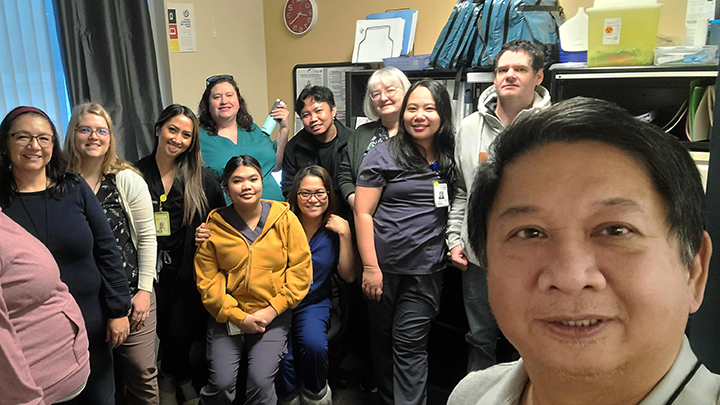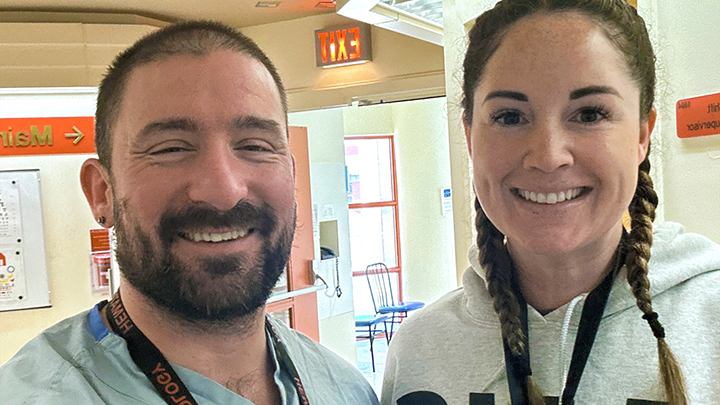
February 24, 2025

Christopher Viola, an AHS locum nurse, poses for a selfie with his co-workers while on assignment in High Level and Fort Vermilion. Photo by Christopher Viola.

Locum nurses like Dave McWilliams, left, seen here with unit manager Amy McLeod, have helped avoid service interruptions at the Cold Lake Healthcare Centre and other sites throughout the North Zone. Photo by Amy McLeod.
Story by Sara Blake | Photos by Christopher Viola & Amy McLeod
FORT VERMILION — Curiosity and a craving for adventure inspired Christopher Viola to try locum nursing.
“I was already working for AHS, but I wanted to experience what it was like working as a travel nurse versus a regular full-time job,” says the homecare case manager. “I enjoy a small-town atmosphere and wanted to see more of Alberta.”
A Registered Nurse (RN), Viola has worked for AHS for more than 20 years, having started his career in Calgary before moving to Spirit River. His manager here encouraged him to look into the North Zone RN/RPN Locum program.
“My first assignment was in High Prairie; I was there for a month,” he adds. “I took three weeks off and then went to High Level for six months. After that I took a few months off, and now I’m in Fort Vermilion. It’s definitely remote, but I like the peace and quiet.”
“It’s the AHS version of travel nursing,” says Kim McGlynn, AHS Relief Team program manager with North Zone Staffing Services. “The intent of the North Zone RN/RPN Locum program is to provide experienced nurses to sites struggling with staffing. Locum nurses go to these sites on temporary assignments, and after a short orientation, are able to hit the ground running.”
Developed with rural and remote communities in mind, the program brings relief to sites with longstanding vacancies and recruitment challenges. Locum nurses reduce reliance on overtime and agency nursing as well as address front-line workload issues and service interruptions.
“Hiring into nursing positions in a rural healthcare centre can sometimes be a challenge,” adds Amy MacLeod, unit manager for the Emergency Department, Operating Room and Ambulatory Clinics at Cold Lake Health Care Centre. “The nurse locum program has helped us ensure our Emergency Department, operating room, and Obstetrics program remain open and safely staffed while we try to fill our nursing vacancies.”
The program offers notable advantages for nurses, receiving sites and the organization as a whole.
“The vast majority of our locum nurses are internal applicants, dedicated to AHS,” says Cathryn Janzen, senior advisor with HR business partnerships for the North Zone. “They already have Connect Care training and knowledge about basic AHS processes, policies and procedures, which helps to streamline the onboarding process. They’re our people, here to support us, for us.”
Rural locum nursing requires professionals with strong clinical acumen, a willingness to practise in small, tight-knit communities and a desire to explore Alberta.
For Viola, the timing was right. Locum nursing has proven to be a positive shift at this point in his life.
“My kids are all grown up now so I can travel more,” he says. “I choose to work longer assignments for stability of staffing and to help sites who need my services. The best part of working as a locum nurse is the flexibility. You can pick and choose your work, where you want to go and how long you want to stay.”
While the number of nurses in the program has more than doubled in the last few years, it reflects how requests for locum nurses have increased, too.
“Many rural communities need nurses with a variety of experience — for example, someone with obstetrics training in addition to emergency department and acute care experience,” says McGlynn. “Not every nurse has the same combination of experience.”
Locum program team members regularly connect with sites to review requests and discuss their specific needs to come up with an appropriate match.
“It gives us the opportunity to remind managers that they can use locum coverage to help with vacation coverage, if needed, to give their permanent staff a much-deserved break,” McGlynn adds. “Getting feedback from the sites is also really helpful to ensure we're meeting their needs — and in recognizing areas where we can improve.”
Feedback from sites and nurses has been positive.
“The locum nurses we’ve had in Cold Lake are great,” says MacLeod. “They’re knowledgeable and have been a huge asset, helping to bridge the gap in services and ensuring safe and effective care for our patients and our community.”
Janzen adds: “Sometimes locums have preferred sites because they've been there before, had a great experience and want to come back. We've actually had locums who've gone to communities and had such a good experience that they end up accepting permanent positions there.”
“We hear, resoundingly, how thankful sites are for the program,” says McGlynn. “They’re grateful for the nurses who are able to bring their experience to these communities, fitting in well with their teams.”
Becoming a locum nurse also brings financial incentives. These nurses earn a premium, along with per-diems for each day spent on an assignment, whether working or not. Currently, a rural incentive premium is also offered for certain areas.
“It’s comparable to what agency nurses earn,” says Janzen. “But our locum nurses are AHS employees with access to benefits. They are empowered as employees, and that's huge.” Leaders are also exploring plans to potentially expand the program to more areas of the province.
“Our locum nurses are here because they want to be part of the organization,” says McGlynn. “They’re not just coming in to do an assignment. There’s a higher level of accountability and that translates through to patient care.”
While he’s always enjoyed being a nurse, Viola says he’s found a fresh level of job satisfaction through his new adventures and the people he’s met as a locum nurse.
“Making a difference in the lives of patients and clients — and being appreciated for the work that you do — it’s really satisfying. That feeling of being wanted, while making a difference, is second to none.”
For more information on the nurse locum program, visit Travel Nurse - North Zone Locum or Discover Travel Nursing.